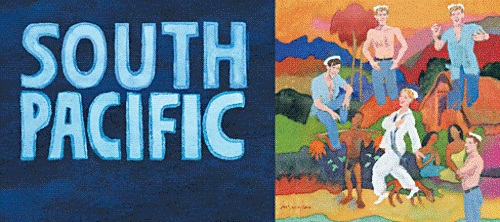
In the early 1940s, composer Richard Rodgers and lyricist Oscar Hammerstein II, each a longtime Broadway veteran, joined forces and began their collaboration by writing two musicals that became massive hits, Oklahoma! (1943) and Carousel (1945). An innovation for its time in integrating song, dialogue and dance, Oklahoma! would serve as "the model for Broadway shows for decades". In 1999, Time magazine named Carousel the best musical of the 20th century, writing that Rodgers and Hammerstein "set the standards for the 20th century musical". Their next effort, Allegro (1947), was a comparative disappointment, running for less than a year, although it turned a small profit. After this, the two were determined to achieve another hit.
According to director Joshua Logan, a friend of both theatre men, he and Leland Hayward mentioned Michener's best-selling book to Rodgers as a possible basis for the duo's next play, but the composer took no action. Logan recalled that he then pointed it out to Hammerstein, who read Michener's book and spoke to Rodgers; the two agreed to do the project so long as they had majority control, to which Hayward grudgingly agreed. Michener, in his 1992 memoirs, however, wrote that the stories were first pitched as a movie concept to MGM by Kenneth MacKenna, head of the studio's literary department. MacKenna's half brother was Jo Mielziner, who had designed the sets for Carousel and Allegro. Michener states that Mielziner learned of the work from MacKenna and brought it to the attention of Hammerstein and Rodgers, pledging to create the sets if they took on the project.
Hayward attempted to buy the rights from Michener outright, offering $500; Michener declined. Although playwright Lynn Riggs had received 1.5% of the box office grosses for the right to adapt Green Grow the Lilacs into Oklahoma!, Michener never regretted accepting one percent of the gross receipts from South Pacific. As Rodgers and Hammerstein began their work on the adaptation, Michener worked mostly with the lyricist, but Rodgers was concerned about the implications of the setting, fearing that he would have to include ukuleles and guitars, which he disliked. Michener assured him that the only instrument he had ever heard the natives play was an emptied barrel of gasoline, drummed upon with clubs.

.png)
.png)




